#covenant in a nutshell
Text
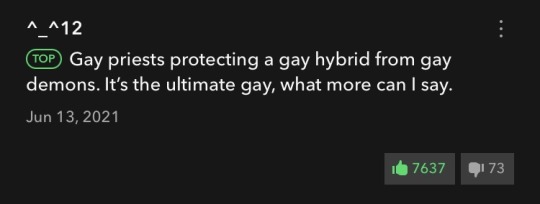
Best comment ever
150 notes
·
View notes
Text
Real talk that "brat? Oh I am a good girl, on my best behavior always" post is ingrained in my head since I saw it, so here is a reminder to myself that it's a good lil comic idea too for Salem and Priest
Her just unashamedly looking Priest in the eye while she says that with the most shit eating grin, meanwhile his glare could probably curdle milk.
#sure it is meant to be read as a kink thing#but this is really just their relationship in a nutshell#ya shouldnt have tried to end her priest#now she is everyones problem#the coven#trash text
10 notes
·
View notes
Text

endling (n): an organism who is the last living member of a family line and whose death consequently means the end of that lineage.
#titan’s council#ripley wolsteen#toh oc#oc#in a nutshell she’s the last of her species that got hunted to extinction by the former Beast-Keeping Coven Head (not Eber) and aging is#what Ripley fears#greatly so she never looks forward to her birthday aside her family no longer being there to celebrate with her
3 notes
·
View notes
Text
The Illusion Coven Head design in a nutshell:
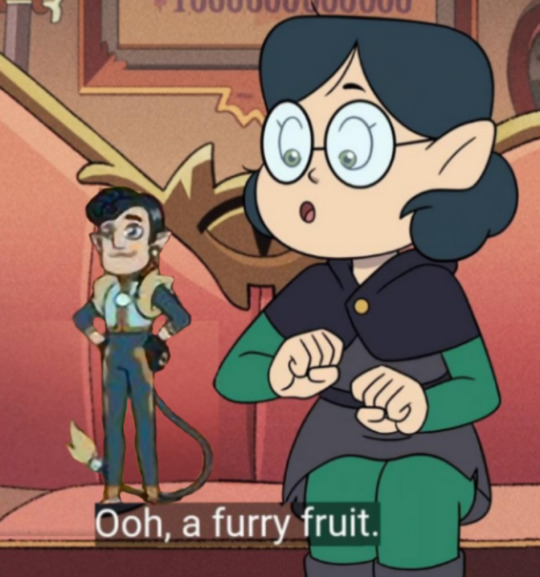
#the owl house#toh#toh spoilers#illusion coven head#coven heads#labyrinth runners#i'm so hyped to finally meet them#it would be rad if they were with the rebellion#especially since illusion magic could be soo extremely helpful when it comes to covering things up or sneaking around#i also want them to interract with darius#let the fruits mix#adrian graye#this aged badly#i will take the L on this one#i'm honestly kinda bummed#but at least he got fangs#my post
2K notes
·
View notes
Text
Random Coven Head HCs
Just for fun, and I'm avoiding HW.
Mason and Vitimir are both perfectionists. Mason because he accidentally constructed one of his school projects wrong and he had to start all over the night before it's due. Lil' Mason got his first few gray hairs that night. Vitimir because he wanted to try and get his parent's attention by being top of his class. Even thought that didn't work, it's also so he doesn't have his potion blow up in his face. Literally.
Hettie has multiple "projects" going on, involving some TF2 Medic-like abominations. Belos is glad, yet terrified to have her on his side, or else his heart may not be his own one morning. Also literally, she is insanely fast.
Adrian has a 2 hour morning and night routine that rivals Darius' 30 minute morning routine. When in college, his suite mate and roommate had to time their trips to the bathroom very carefully. That, or try to convince Adrian to wear a concealment stone.
Osran briefly had a job of being a fortune teller. He was fired for seeing the customer's future all the way until their deaths. He still does it and knows when and how Terra will die. And has told her. She might as well drop there with how close it is.
Eberwolf has brought fleas into the palace not once, not twice, not even thrice, but a total of 15 times. No one knows how, but it's a week of hell each time. It takes Mason, Vitimir, Darius, and Osran to just hold him down while the Scouts try to quickly draw a bath. All but Osran get fleas since he uses his spirit hand and they envy him for it.
Terra tried to poison Hettie out of spite by putting crushed up poisonous berries in her drink. Well, what she thought was Hettie's drink. It was actually Vitimir's, but because of his corrosive breath/acidic saliva, it had no effect. But he says it made the drink taste sweeter!
Raine and Eberwolf have this "duet" where Raine plays their choice of instrument and Eberwolf howls along extremely off key and off beat. Raine tolerates it because it agitates Terra in the morning and karma is a bitch.
Mason, when overwhelmed, curls up in a ball and makes a sort of "cave" around himself for a bit until he feels better. The one downside is that he forgets to deconstruct these "caves", so there's just nests made from the ground all around the castle grounds. He gets overwhelmed by his students mostly, so Raine lends him some sympathy.
Darius accidentally told Adrian to "try and relax" after Adrian realized he has a cowlick. In a nutshell, it wasn't a pretty sight.
Kikimora almost got eaten by one of Terra's plants. No, obviously Terra isn't sorry. No, the plant isn't sorry either. No, the plant didn't want to eat her after tasting her. Yes, Kikimora taunts it after that.
Adrian and Vitimir hate each other. Adrian has rearranged Vitimir's messy, but organized potion room multiple times. Once, all of his ingredients were in alphabetical order, another time was by color, and the last was by the height of the containers. Vitimir gets his revenge by switching his shampoo with hair dye. Adrian's hair has been every color of the coven system.
#the owl house#toh#toh headcanon#coven heads#hettie cutburn#vitimir#mason#adrian graye#darius deamonne#osran#terra snapdragon#eberwolf the huntsman#coven heads headcanons#Glad I wasn't Belos#kikimora
54 notes
·
View notes
Text
Anonymous ask: What do you think of the new Indiana Jones movie? And of Phoebe Waller-Bridge?
In a nutshell: From start to finish ‘Indiana Jones and the Dial of Destiny’ is watching Indiana Jones being a broken-down shell of a once great legacy character who has to be saved by the perfect younger and snarky but stereotypical ’Strong Independent Woman’ that passes for women characters in popcorn movies today.
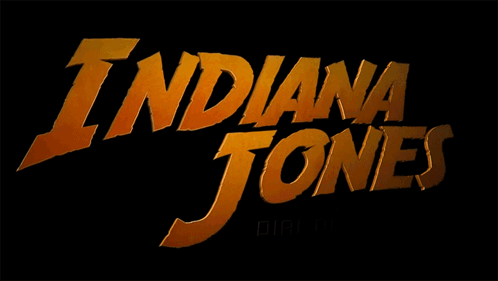
I went in to this film with conflicted feelings. On the one hand I was genuinely excited to see this new Indiana Jones movie because it’s Indiana Jones. Period. Yet, on the other hand I feared how badly Lucasfilm, under Kathleen Kennedy’s insipid woke inspired CEO studio direction, was going to further tarnish not just a screen legend but the legacy of both George Lucas and Steven Spielberg. The cultural damage she has done to such a beloved franchise as the Star Wars universe in the name of progressive woke ideology is criminal. The troubled production history behind this film and its massive $300 million budget (by some estimates) meant Disney had a lot riding on it, especially with the future of Kathleen Kennedy on the line too as she was hands on with this film.
To me the Indiana Jones movies (well, the first three anyway, the less we say about ‘Kingdom of the Crystal Skull’ the better) were an important part of my childhood. I fell in love with the character instantly. Watching ‘Raiders of the Lost Ark’ (first on DVD in my boarding school dorm with other giggly girls and later on the big screen at a local arts cinema retrospective on Harrison Ford’s stellar career) just blew me away.
As a girl I wanted to be an archaeologist and have high falutin’ adventures; I even volunteered in digs in Pakistan and India (the Indus civilisation) as well as museum work in China as a teen growing up in those countries and discovering the methodical and patient but back breaking reality of what archaeology really was. But that didn’t dampen my spirit. Just once I wanted to echo Dr. Jones, ‘This belongs in a museum!’ But I happily settled for studying Classics instead and enjoyed studying classical archaeology on the side.

I couldn’t quite make sense why Indiana Jones resonated with me more than any other action hero on the screen until much later in life. Looking like Harrison Ford certainly helps. But it’s more than that. I’ve written this elsewhere but it’s worth repeating here.
‘Raiders of the Lost Ark’ is considered an inspiration for so many action films yet there’s a very odd aspect to the film that’s rather unique and rarely noticed by its critics and fans. It’s an element that, once spotted, is difficult to forget, and is perhaps inspiring for times like the one in which we currently live, when there are so many challenges to get through. Typically in action films, the hero faces an array of obstacles and setbacks, but largely solves one problem after another, completes one quest after another, defeats one villain after another, and enjoys one victory after another.
The structure of ‘Raiders’ is different. A quick reminder:
- In the opening sequence, Indiana Jones obtains the temple idol only to lose it to his rival René Belloq (Paul Freeman).
- In the streets of Cairo, Indy fails to protect his love, Marion Ravenwood (Karen Allen), from being captured (killed, he assumes).
- In the desert, he finds the long-lost Ark of the Covenant, only to have it taken away by Belloq.
- Indy then recovers the ark only to have it stolen a second time by Belloq, this time at sea.
- On an island, Indy tries to bluff Belloq into thinking he’ll blow up the ark. His bluff fails. Indy is captured.
- The climax of the film literally has its hero tied to a post the entire time. He’s completely ineffectual and helpless at a point in the movie where every other action hero is having their greatest moment of struggle and, typically, triumph.
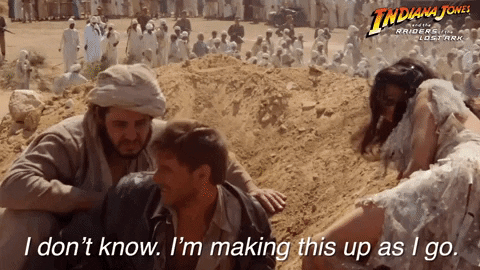
If Indiana Jones had done absolutely nothing, if the famed archeologist had simply stayed home, the Nazis would have met the same fate - losing their lives to ark’s wrath because they opened it. It’s pretty rare in action films for the evil arch-villains to have the same outcome as if the hero had done nothing at all.
Indy does succeed in getting the ark back to America, of course, which is crucial. But then Indy loses the ark, once again, when government agents send it to a warehouse and refuse to let him study the object he chased the whole film. In other words: Indiana Jones spends ‘Raiders’ failing, getting beat up, and losing every artefact that he risks his life to acquire. And yet, Indiana Jones is considered a great hero.
The reason Indiana Jones is a hero isn’t because he wins. It’s because he never stops trying. I think this is the core of Indiana Jones’ character.
Critics will go on about something called agency as in being active or pro-active. But agency can be reactive and still be kinetic to propel the story along. It’s something that has progressively got lost as the series went on. With the latest Indiana Jones film I felt that Indiana Jones character had no agency and ends up being a relatively passive character. Sadly Indiana Jones ends up being a grouchy, broken, and beat up passenger in his own movie.
Released in 1981, ‘Raiders of the Lost Ark’ remains one of the most influential blockbusters of all time. Exciting action, exotic adventure, just the right amount of romance, good-natured humour, cutting-edge special effects: it was all there, perfectly balanced. Since then, attempts have been made to reproduce this winning recipe in different narrative contexts, sometimes successfully (’Temple of Doom’ and ‘the Last Crusade’), usually in vain (’Crystal Skull’).
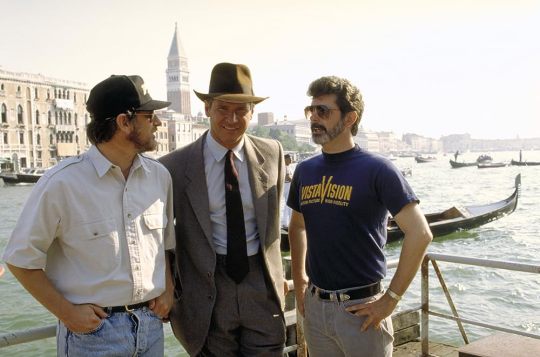
What are the key ingredients of an Indiana Jones movie? There are only four core elements - leaving aside aspects of story such as the villain or the goal - that you need in place before anything else. They are: the wry, world-weary but sexy masculine performance of Harrison Ford; the story telling genius of George Lucas steeped in the lore of Saturday morning action hero television shows of the 1950s; the deft visual story telling and old school action direction of Steven Spielberg; and the sublime and sweeping music of the great John Williams. This what made the first three films really work.
In the latest Indiana Jones film, you only have one. Neither Lucas and Spielberg are there and arguably neither is Harrison Ford. John Williams’ music score remains imperious as ever. His music does a lot of heavy lifting in the film and let’s face it, his sublime music can polish any turd.
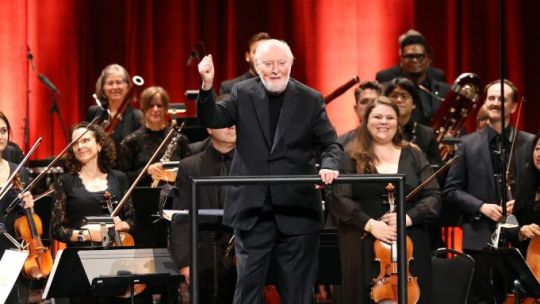
This isn’t to say the ‘Dial of Destiny’ is a turd. I won’t go that far, and to be honest some of the critical reaction has been over-hysterical. Instead I found it enjoyable but also immensely frustrating more than anything else. It had potential to be a great swan song film for Indy because it had an exciting collection of talent behind it.
In the absence of Spielberg, one couldn’t do worse than to pick James Mangold as next best to direct this film. Mangold is a great director. I am a fan of his body of work. After ‘Copland’, ‘Walk the Line’, ‘Logan’ and ‘Le Mans 66’ (or ‘Ford vs Ferrari’), James Mangold has been putting together a fine career shaped by his ability to deliver stories that rediscover a certain old-fashioned charm without abusing the historical figures - real or fictional - he tackles. And after Johnny Cash, Wolverine and Ken Miles, among others, I had high hopes he would keep the flame alive when it came to Indiana Jones. Mangold grew up as a fanboy of Spielberg’s work and you can clearly see that in his approach to directing film.
But in this film his direction lacks vitality. Mangold, while regularly really good, drags his feet a little here because he’s caught between putting his own stamp on the film and yet also lovingly pay homage to his hero, Spielberg. It’s as if he didn't dare give himself away completely, the director seems too modest to really take the saga by the scruff of the neck, and inevitably ends up suffering from the inevitable comparison with Steven Spielberg.
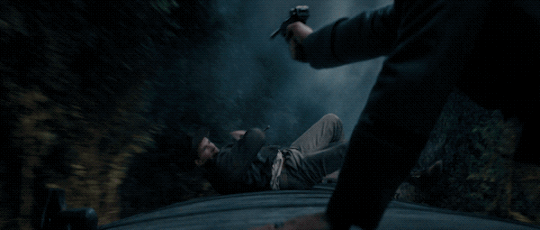
Mangold tries to recreate the nostalgic wonder of the originals, but doesn't quite succeed, while succumbing to an overkill of visual effects that make several passages seem artificial. The action set pieces range from pedestrian to barely satisfying. The prologue sequence was vaguely reminiscent of past films but it was still a little too reliant on CGI. The much talked about de-ageing of Harrison Ford on screen was impressive (and one suspects a lot of the film budget was sunk right there). But Indiana’s lifeless digitally de-aged avatar fighting on a computer-generated train, made the whole sequence feel like the Nazi Polar Express. Because it didn’t look real, there was no sense of danger and therefore no emotional investment from the audience. You know Tom Cruise would have done it for real and it would have looked properly cinematic and spectacular.
The tuk tuk chase through the narrow streets of Tangiers was again an exciting echo of past films, especially ‘Raiders’, but goes on a tad too long, but the exploration of the ship wreck (and a criminally underused cameo by Antonio Banderas) was disappointing and way too short.
The main problem here is the lack of creativity in the conception of truly epic scenes, because these are not dependent on Ford's age. Indeed, the film could very well have offered exhilarating action sequences worthy of the archaeologist with the whip, without relying solely on the physicality of its leading man. You don't need a Tom Cruise to orchestrate great moments but you could do worse than to follow his example.
Mangold uses various means of locomotion to move the character - train, tuk tuk, motorbike, horse - and offers a few images that wouldn't necessarily be seen elsewhere (notably the shot of Jones riding a horse in the middle of the underground), but in the end shows himself to be rather uninspired, when the first three films in the saga conceived some of the most inventive sequences in the genre and left their mark on cinema history. There are no really long shots, no iconic compositions, no complex shots that last and enrich a sequence, which makes the film look too smooth and prevents it from giving heft to an adventure that absolutely needs it.

And so now to the divisive figure of Phoebe Waller-Bridge.
It’s important here to separate the person from the character. I like Phoebe Waller-Bridge and I loved her in her ‘Fleabag’ series. She excels in a very British setting. I think she is funny, irreverent, and a whip smart talented writer and performer. I also think she has a particular frigid English beauty and poise about her. When I say poise I don’t mean the elegant poise of a Parisienne or a Milanese woman, but someone who is cute and comfortable in her own skin. You would think she would be more suited to ‘Downton Abbey’ setting than all out Hollywood action film. But I think she almost pulls it off here.
In truth over the years Phoebe Waller-Bridge, known for her comedy, has been collecting franchises where she is able to inflict her saucy humour into a hyper-masculine space. I don’t think her talent was properly showcased here.
Hollywood has this talent for plucking talented writers and actors who are exceptional in what they do and then hire them do something entirely different by either miscasting them or making them write in a different genre. I think Phoebe Waller-Bridge is exceptional and she might just rise if she is served by a better script.
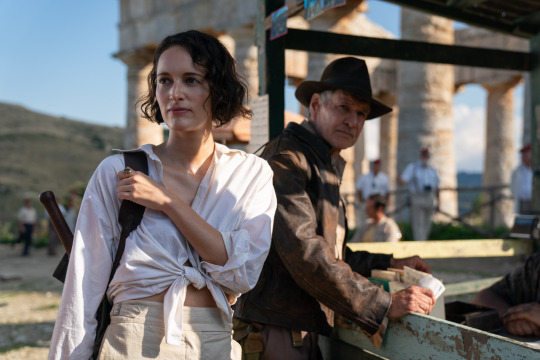
In the end I think she does a decent stab at playing an intriguing character in Helena Shaw, Indy’s long lost and estranged god daughter and a sort of amoral rare artefacts hustler. Phoebe Waller-Bridge brings enthusiasm, charm and mischief to the role, making her a breath of fresh air. She seems to be the only member of the on-screen cast that looks to be enjoying themselves.
To be fair her I thought Waller-Bridge was a more memorable and interesting female character than either Kate Capshaw (’Temple of Doom’, 1984) and Alison Doody (’Last Crusade’, 1989). She certainly is a marked improvement on the modern woke inspired insipid female action leads such as Brie Larson (’Captain Marvel’), or any women in the Marvel universe for that matter, or Katherine Waterson (’Alien Covenant’). Waller-Bridge could have been reminiscent of Kathleen Turner (’Romancing the Stone’) and more recently Eva Green, actresses who command attention on screen and are as captivating, if not more so, than the male protagonists they play opposite.
To be sure there have been strong female leads before the woke infested itself into Hollywood story telling but they never made it central to their identity. Sigourney Weaver in ‘Alien’ and Linda Hamilton in the ‘Terminator’ franchise somehow conveyed strength of character with grit and perseverance through their suffering, while also being vulnerable and confident to pull through and succeed. Phoebe Waller-Bridge’s character isn’t quite that. She doesn’t get into fist fights or overpowers big hulking men but she uses cheek and charm to wriggle out of tight spots. She’s gently bad ass rather the dull ‘strong independent woman’ cardboard caricatures that Marvel is determined to ram down every girl’s throat. If Waller-Bridge’s character was better written she might well have been able to revive memories of the great ladies of Hollywood's golden age who had the fantasy and the confidence that men quaked at their feet.
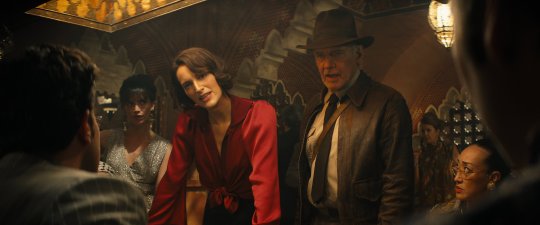
What lets her character down is the snark. She doesn’t pepper her snark but she drowns in it. All of it directed at poor Indy and mocking him for his creaking bones and his entire legacy. It’s a real eyesore and it is a real let down as it drags the story down and clogs up the wheels that power the kinetic energy that an adventure with Indiana Jones needs. ‘The grumpy old man and the young woman with the wicked repartee set off across the vast world’ schtick is all well and good, but it does grate and by the end it makes you angry that Indy has put up with this crap. I can understand why many are turned off by Waller-Bridge’s character. As a female friend of mine put it, we get the talented Phoebe Waller Bridge’s bitter and unlikable Helena acting like a bitter and unlikable man. But it could be worse, it could be as dumb as Shia LaBeouf‘s bad Fonzie impersonation in 'Crystal Skull’.
I would say there is a difference between snark and sass. Waller-Bridge’s character is all snark. If the original whispers are true the original script had her way more snarkier towards Indy until Ford threatened to leave the project unless there were re-writes, then it shows how far removed the producers and writers were from treating Indy Jones with the proper respect a beloved legacy character deserves. It’s also lazy story telling.
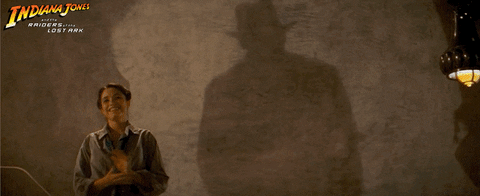
Karen Black gave us real sass with Marion Ravenwood in ‘Raiders’. Her character was sassy, strong, but also vulnerable and romantic. She plays it pitch perfect. Of all the women in Indy’s life she was good foil for Indy.
Spielberg is so underrated for his mise-en-scène. We first meet Marion running a ramshackle but rowdy tavern in Tibet (she’s a survivor). She plays and wins a drinking game (she’s a tough one), she sees Indy again and punches him (she’s angry and hurt for her abandoning her and thus revealing her vulnerability). She has the medallion and becomes a partner (she’s all business). She evades and fights off the Nazis and their goons, she even uses a frying pan (she’s resourceful but not stupid). She tries on dresses (she’s re-discovers her femininity). Indy saves her but she picks him up at the end of the film by going for a drink (she’s healing and there’s a chance of a new start for both of them). This is a character arc worth investing in because it speaks to truth and to our reality.
The problem with Phoebe Waller-Bridge’s character is that she is constantly full on with the snark. Indy and Helena gripe and moan at each other the entire film. Indy hasn’t seen her in years, and she felt abandoned after her father passed, so there’s a lot of bitterness. It’s not unwarranted, but it also isn’t entertaining. It’s never entertaining if the snark makes the character too temperamental and unsympathetic for the audience to be emotionally invested in her.
I think overall the film is let down by the script. Again this is a shame. The writing talent was there. Jez and John-Henry Butterworth worked with James Mangold on ‘Ford v. Ferrari’ and co-wrote ‘Edge of Tomorrow‘ while David Koepp co-wrote the first ‘Mission: Impossible’ (but he also penned Indiana Jones and the ‘Kingdom of the Crystal Skull’, and the 2017 version of ‘The Mummy’ that simultaneously started and destroyed Universal’s plans for their Dark Universe). I love the work of Jez Butterworth who is one of England’s finest modern playwrights and he seemed to have transitioned fine over to Hollywood. But as anyone knows a Hollywood script has always too many cooks in the kitchen. There are so many fingerprints of other people - studio execs and directors and even stars - that a modern Hollywood script somehow resembles a sort of Ship of Theseus. It’s the writer’s name on the script but it doesn’t always mean they wrote or re-wrote every word.
Inevitably things fall between the cracks and you end up filming from the hip and hoping you can stitch together a coherent narrative in post-production editing. Clearly this film suffered from studio interference and many re-writes. And it shows because there is no narrative fluidity at work in the film.

Mads Mikkelsen’s Nazi scientist is a case in point. I love Mikkelsen especially in his arthouse films but I understand why he takes the bucks for the Hollywood films too. But in this film he is phoning in his performance. Mads Mikkelsen does what he can with limited screen time to make an impact but this character feels so recycled from other blockbusters. Here the CIA and US Government are evil and willing to let innocent Americans be murdered in order to let their pet Nazi rocket scientist pursue what they believe to be a hobby. But to be fair the villains in the Indy movies have never truly been memorable with perhaps Belloq, the French archaeologist and nemesis of Indy in ‘Raiders’, the only real exception. It’s just been generic bad guys - The Nazis! The Thugee death cult! The Nazis (again)! The Commies! Now we’re back to Nazis again which is not only safer ground for the Indy franchise but something we can all get behind.
However Mads Mikkelsen’s Dr. Voller, is the blandest and most generic Nazi villain in movie history. At the end of World War II, Voller was recruited by the US Government to aid them in rocket technology. Now that he’s completed his task and man has walked on the moon, he’s turning his genius to his ultimate purpose, the recovery of the ‘Dial of Destiny’ built by Archimedes. Should he find both pieces of the ancient treasure, he plans to return to 1930s Nazi Germany, usurp Hitler, and use his advanced knowledge of rocket propulsion to win the war. In a sense then he was channeling his inner Heidegger who felt Hitler had let down Nazism and worse betrayed Heidegger himself.
So there is a character juxtaposition between Voller and Indy in the sense both men feel more comfortable in the past than the present. But neither is given face time together to explore this intriguing premise that could have anchored the whole narrative of the film. It’s a missed opportunity and instead becomes a failure of character and story telling.

Then there are the one liners which seemed shoe horned in to make the studio execs or the writers feel smug about themselves. There are several woke one lines peppered throughout the film but are either tone deaf or just stupid.
“You trigger happy cracker”- it’s uttered without any self-awareness by a black CIA agent who is chaperoning the Nazi villain. Just because white people think it’s dumb and aren’t bothered by it doesn’t make it any less a racial slur. If you want authenticity then why not use the ’N’ word then as it would historically appropriate in 1969? The hypocrisy is what’s offensive.
“You stole it. He stole it. I stole it. It’s called capitalism.” - capitalism 101 for economic illiterate social justice warriors.
“[I’m] daring, beautiful, and self-sufficient” - uttered by Helena Shaw as a snarky reminder that she’s a strong independent woman, just in case you forgot.
“It’s not what you believe but how hard you believe.” - Indiana Jones has literally stood before the awesome power of God when the Ark of the Covenant was opened up by the Nazis, and they paid the price for it by having their faces melted off. Indy has drunk from the authentic cup of Christ, given to him by a knight who’s lived for centuries, that gave him eternal life and heal his father from a fatal bullet wound. So he’s figuratively seen the face of God (sure, he closed his eyes) and His holy wrath, and has witnessed the divine healing power of Christ first hand. And yet his spews out this drivel. It’s empty of any meaning and is a silly nod to our current fad that it’s all about the truth of our feelings, not observable facts or truth.

For me though the absolute worse was what they did to Indiana Jones as a character. Once the pinnacle of masculinity, a brave and daring man’s man whose zest for life was only matched by his brilliance, Henry Jones Jr. is now a broken, sad, and lonely old man. Indiana Jones is mired in the past. Not in the archaeological past, but in his own personal past. He's asleep at the wheel, losing interest in his own life. He's lost his son, he's losing his wife. He's been trying to pass on his passion, his understanding to disinterested people. They're not so interested in looking at the past. He remains a man turned towards the past, and then he finds himself confronted by Helena, who embodies the future. This nostalgia, this historical anchoring, becomes the main thread of the story.The film tries to deconstructs Indiana Jones on the cusp of retirement from academia and confronts him with a world he no longer understands. That’s an interesting premise and could have made for a great film.
It’s clear that the filmmakers’ intention was for a lost and broken Indiana to recapture his spirit by the film’s end. However, its horrible pacing and meandering and underdeveloped plot, along with Harrison Ford’s miserably sad demeanour in nearly every scene, make for a deeply depressing movie with an empty and unearned resolution.
By this I mean at the very end of the film. It’s meant to be daring and it is. There’s something giddy about appearing during the middle of siege of Syracuse by blood thirsty Romans and then coming face to face with Archimedes himself. The film seems to want to justify the legendary, exceptional aura and character of Indy himself by including him in History. Hitherto wounded deep down inside, and now also physically wounded, Indy the archaeologist tells Helena that he wants to stay here and be part of history.
It's a lovely and even moving moment, and you wonder if the film isn't going to pull a ‘Dying Can Wait’ by having its hero die in order to strengthen its legend. But in a moment that is too brutal from a rhythmic point of view, Helena refuses, knocks out her godfather and takes him back to the waiting plane and back to 1969. The next thing Indy sees he’s woken up back in his shabby apartment in New York.
I felt cheated. I’m sure Indy did too.
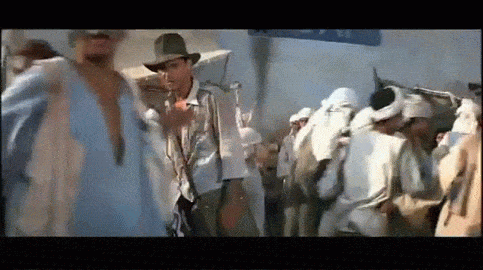
After all it was his choice. But Helena robbed him of the freedom to make his own decisions. She’s the one to decide what’s best. In effect she robbed him of agency. Even if it was the wrong decision to stay back in time, it’s so important from a narrative and character arc perspective that Indy should have had his own epiphany and make the choice to come back by himself because there is something worth living for in the future present - and that was reconciling with Marion his estranged wife. But damn it, he had to come to that decision for himself, and not have someone else force it upon him. That’s why the ending feelings so unearned and why the story falls flat as a soufflé when you piss on it.
‘Indiana Jones and the Dial of Destiny’ feels like the type of sequel that aimed to capture the magic of its predecessors, had worthwhile intentions, and a talented cast, but it just never properly materialised. In a movie whose pedigree, both in front and behind the camera, is virtually unassailable, it’s inexcusable that this team of filmmakers couldn’t achieve greater heights.
The film was a missed opportunity to give a proper send off to a cinematic legend. Harrison Ford proving that whatever gruff genre appeal he possessed in his heyday has aged better than Indy’s knees. He may be 80, but Ford carries the weight of the film, which, for all its gargantuan expense, feels a bit like those throwaway serials that first inspired Lucas - fun while it lasts, but wholly forgettable on exit.
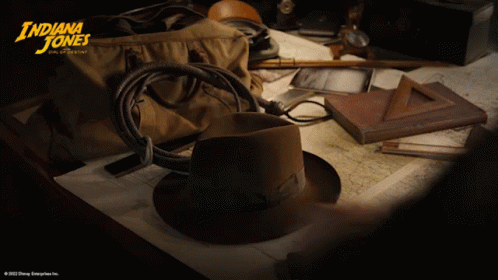
I wouldn’t rate ‘Indiana Jones and the Dial of Destiny’ as the worst film in the franchise - that dubious honour still lies with ‘Kingdom of the Crystal Skull’. Indeed the best I can say is that I would rate this film at the benchmark of “not quite as bad as Crystal Skull”.But it’s definitely time to retire and hang up the fedora and the bull whip.
For what’s worth I always thought the ending of ‘Last Crusade’ where Indy, his father Henry Jones Snr., and his two most faithful companions, Sallah and Marcus Brody, ride off into the sunset was the most fitting way to say goodbye to a beloved character.
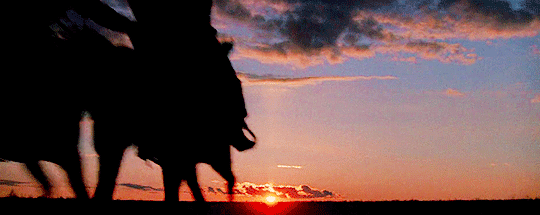
Instead we have in ‘Dial of Destiny’ the very last scene which is meant to be this perfect ending: Indiana Jones in his scruffy pyjamas and his shabby apartment. Sure, the exchange between a reconciling Indy and Marion is sincere and touching. But that only works because it explicitly recalls ‘Raiders of the Lost Ark’. That's what Nietzsche would call “an eternal return”.
I shall eternally return to watch the first three movies to delight in the adventures of the swashbuckling archaeologist with the fedora and a bull whip. The last two dire films will be thrown into the black abyss. Something even Nietzsche would have approved of.

Thanks for your question.
#ask#question#indiana jones the dial of destiny#dial of destiny#indiana jones#lucasfilm#harrison ford#phoebe waller bridge#james mangold#steven spielberg#george lucas#john williams#kathleen kennedy#disney#film#cinema#movies#arts#cancel culture#personal
107 notes
·
View notes
Text
Past Life Dark Urge Asks - 8th Edition:
The Patriars, what does Durge think of them? Do they share the same mindset as Gortash or do they maybe like some of the messed up stuff the patriars did?
Durge was around when Elturel was dragged into Avernus, what did Durge think of these events? Were they maybe even personally affected by the aftermath?
Did Durge ever believe in a deity that wasn't Bhaal? Which one?
Gortash wanted to ascend as God himself, and he wanted Durge to join him. But what did Durge think of that plan? We're they on board or did they consider it heresy?
What does Durge think of Bards? Do they like them, despise them, did anything ever happen?
The vampire coven in Baldurs Gate is responsible for a lot of people disappearing. Did Durge take advantage of it and blame some of their murders on them? Did they dislike them?
Children; a great source of joy, perhaps annoyance, and certainly nutrition. But what exactly was your Durge's opinion on them besides being a great snack?
Spelljammers are a beloved mode of transportation on Toril, both for military and cargo means. Did Durge ever board one of these vessels, and what did they think? Or did the sole idea of getting close to something like that terrify them?
Generally speaking, if Durge needed to travel, how would they go about it? By foot or horse, or did they have a familiar to use?
Describe them with 1 quote, it can be anything you like but give me their whole being in a nutshell.
#bg3#bg3 spoilers#durge#dark urge#bg3 durge#daemons ask game#dark urge ask game#durge ask game#bg3 ask game#ask game
23 notes
·
View notes
Note
Hello! I hope that you are doing well!
I just wanted to send you a question regarding the amount of power Rhea has in Fódlan since something came to my mind. You know how during Edelgard's coronation, she said to her father that, "The Archbishop of the Church of Seiros would normally act as witness, but my professor will fill that role instead"?
Unless I missed something [or am overthinking], do you believe that Rhea was even there to witness Ionius' coronation?
We were told in the game that it had been ages since a member of House Hresvelg enrolled into the Officers Academy as well as that there had recently been a rift between the Adrestian Empire and the Church of Seiros.
Therefore, to me at least, that implied that said rift had been going on for a while. And I do not see why they would allow her there if such a thing was going on. Yet, Rhea does not retaliate against this as far as I know. Then there is the fact that Edelgard is allowed to be coronated without Byleth's presence. The Southern Church was dismantled, too, so…I think it is safe to say that there was not an official to witness her from there as well. lol
To put it simply, it feels very contradictory to me and adds a crack into the "Rhea controls Fódlan" perspective.
Hi!
I agree, that NPC going all "the empire and hthe church cut ties eons agao that's why supreme leader is the first imperial heir to attend since ages" suggests Rhea wasn't very welcomed in Enbarr.
FWIW the Nopes book about the Southern Church incident reveals the Emperor of that time already wanted to cut ties with the Central Church - and used this rebellion (which was more or less a Varley daughter wanting to have a role instead of letting her bother inherit everything?) as an excuse to finally give them the boot.
In a nutshell, I heavily doubt Rhea was around when Ionius was coronated, if her Church was already "not welcomed" by the time the Southern Church was disbanded.
The Archbishop acting as witness might be just some sort of old ceremonial thing, just like the "covenant of the red blood and the white sword", maybe all coronations try to renact the "oath" Wilhelm took/swore to Seiros when she presumably made him Emperor of Adrestia? And the Archbishop acts as a stand in for Seiros (even if we know better!) when the oath is sworn again by Willy's descendants?
As you pointed out, the Archbishop being present or not is merely decorum, since nowhere the game suggests that in the non-CF routes, Supreme Leader's coup coronation isn't regular or anything.
Rhea controlling Fodlan isn't backed up by canon, Adrestia has been doing its own thing for several centuries, the CoS only provides help (the game doesn't tell us what it is!) to Faerghus : Dimitri becomes King not because Rhea crowns or splashes oil on him, but because he is the Crown Prince and the last heir of the previous King. As for the Alliance, it does its own thing without her input!
#dovehearts-blog#replies#FE16#Rhea/the CoS controls Fodlan is a take sponsorised by NoA and Treehouse#even in the european websites we didn't get that shit to describe Fodlan#on that regard we're closer to the jp description of the continent than to the US one for once#I'd say Rhea has a complicated relationship with Adrestian Emperors#she can't help but be disappointed because they're not Wilhelm and will never equal him#only he has the 'great' title lol#and they don't follow the CoS and its principles like remember when they tried to invade Brigid/Dagda? Or fed northeners to beasts for fun?#and yet they're the scions of Wilhelm so maybe she can call them her allies? If she needs help they will provide? (we know how it ends lol)#in the half lizard lycaon AU she has even more conflicted feelings bcs#those people aren't willy nor lycaon when it was him who was supposed to be there#everytime she witnesses a new coronation she remembers this coronation happens#because her kid was torn apart by the very people she's crowning#children aren't their parents she knows it and yet there's still that small heartache#bcs Ionius 1 to Ionius 9 aren't Lycaon#back to canon i guess the CoS's presence in Adrestia is mostly ceremonial#to replay the willy'n'seiros alliance#but nothing as important as if Rhea says tut-tut the Emperor cannot be crowned#rhea stuff
17 notes
·
View notes
Text
Vague WIP Summary
Tagged by the fantastic @winglesswriter
Rules: Summarize your WIP in 15 bullet points, but do it badly
Passing the tag onto @ryns-ramblings @minutiaewriter @writingamongther0ses @christaaah @meerawrites @cee-grice and leaving an open tag for folk who may want to join in :)
Consider this a bad summary of Blood Covenant (Formerly known as Blood Harmony- but I've changed the title to something that fits the themes better- I hope!)
Mavis' character arc in a nutshell:
One man's terrorist is another man's freedom fighter
Small act of terrorism/freedom fighting
Have first kiss with Nemesis before being blown up
Survive
Indulge in some daddy issues
Get expelled for being too good at your job
Make plans to redeem yourself
Get a tattoo
Redeem yourself
Get kicked out again- this time for being bad at your job
Confront your daddy issues and childhood trauma
Repress that trauma through alcohol and bad decisions. Have an existential crisis/pity party
Use those bad decisions (and a crowbar) to work on healing your inner child
Confront Daddy Issues with the crowbar, and some mild arson
Learn absolutely nothing from all of this; repress everything, and get on with life.
#mavis baird#She's a great character to write#very cathartic#but writing out her story#man...i feel bad for the things I have put her through.#Sorry Mave
2 notes
·
View notes
Note
Wait who is your fave VC vamp and why??
… ARMAND.
I can’t write, and no one’s inclined to read, an entire dissertation lol but this is important to me so I’ll attempt to nutshell hold my beer:
This is truly the character for the person that wants to experience it all. I always thought Armand was AR’s most tragic and complex creation, and I figure the only reason he managed to (mostly) avoid the fate of Lestat, and to an extent, Louis, is because he wasn’t a self-insert (I still love them though). And as much I would’ve LOVED more of him in the later books, I’m glad my boy didn’t get completely massacred.
After his cult is destroyed, he’s always trying to learn and grow, to an almost maniacal, obsessive degree. He desperately wants to recapture some sense of time and have a place in the world. From tearing through Lestat’s books in the tower to exploring the human world with Daniel, and still making an effort to be part of it and live among humans in the later books. His thirst for knowledge captivates me.
Armand knows how to play every one of his strengths to his advantage. This is the man with the plan. He’s cunning, willful, tenacious, patient, charming, ruthless, resilient, sensual, evocative—whatever he needs to be. He can be just as expressive and emotive as he can be detached and closed-off. Survival tactics when he had no other choice, but he’s learned to balance the ratios a bit now.
After everything, he’s trying to do better. He knows he’s no saint, and he never thought he was. Marius did. The level of character development—going from what Lestat found in a filthy cemetery in TVL to QotD, through MtD and TVA, to end up where he does by end of the series—is unmatched in VC. Even exhausted, depressed, heartbroken, and defeated throughout the centuries (and then surviving his suicide attempt) Armand pushes on and is finally able to create a lasting home with a family for himself. That resonates with me deeply.
Almost 300 years later and, as much as he absolutely adores the idiot, he’s still calling Lestat out on his bullshit even by the end of the series. This is important. Someone has to carry the braincells in that coven, sorry babe.
BONUS: one of my all-time favorite fanarts by @sheepskeleton: https://sheepskeleton.tumblr.com/post/141159959125/exploring-the-darkness-4-i-had-the-heart-and
And one of my favorite quotes:
“This was the coven master, surely, this quiet and forceful one, the one who would survive, no matter how the orphan in him wept.” ~ Lestat, TVL
TL; DR - we vibe, and I enjoy analyzing him like a lil’ lizard in a terrarium *gives cricket*
#you ask and hekate answers#and then some#I tried but this has been my TedTalk#blorbo appreciation post#mildly meta#vc#the vampire chronicles#armand
101 notes
·
View notes
Text
I feel like, eventually, Nick could have his third act breakdown. I don't know what would cause it. But he certainly could. And it would be centered around the idea of admitting to his coven, "I say I'm fine being alone, but I'm not" in a nutshell. A full emotional breakdown.
2 notes
·
View notes
Note
More Belos propaganda, looking at the literal side of The Corruption and the religious elements:

This is what he actually looks like thanks to centuries of sustaining himself by eating Palismen.

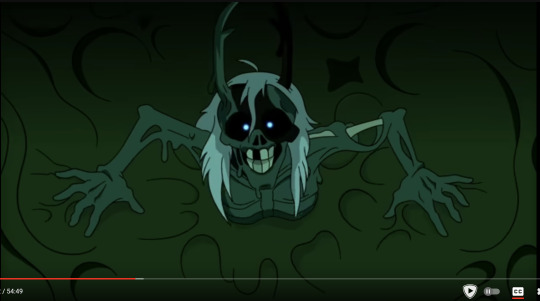
Here's his main body by "Watching and Dreaming."

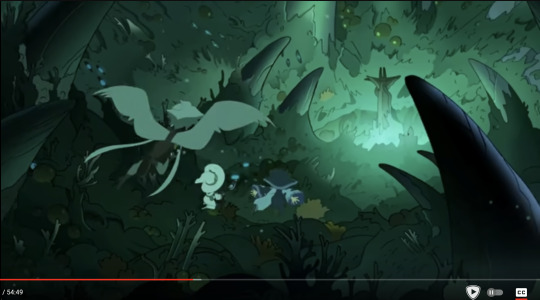


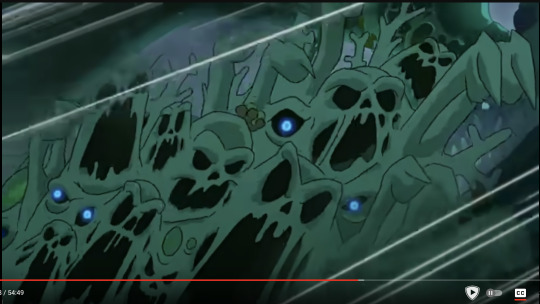
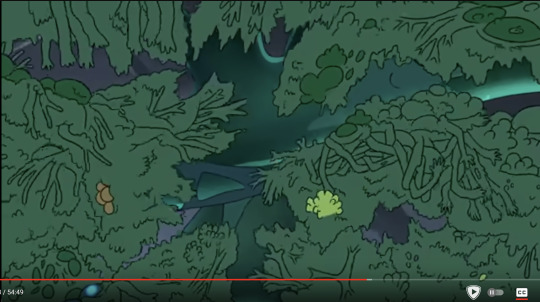
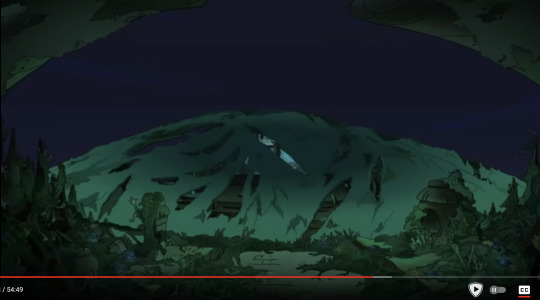
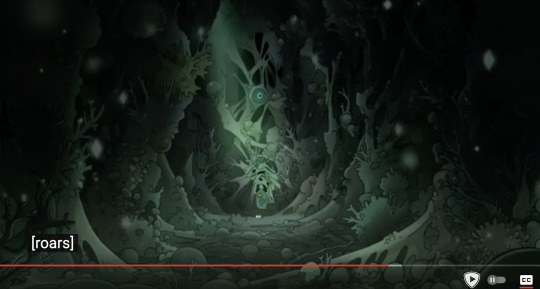
And this is his final form--a continent-eating fungus/algae/moss of meat, a metaphorical cancer that has infected the heart of god, unnaturally green in a world of red, devouring and detroying everything it touches.
Because that's Belos in a nutshell. He positions himself as a savior, a visionary, a prophet, a hero. He's someone you can trust, a loving ruler who has your best interests at heart, who just wants to guide you to the light. But he's really just a manipulative cult leader who loathes everyone in the Boiling Isles and wants nothing more than to see every single one of these people he's tricked into loving him die painfully:
"I'll do anything to save humanity from evil."
"We. Don't. Belong here!"
"Finally! I CAN CLEANSE THIS PERDITION... MYSELF!"
"We're human! We're better than this!"
At every turn, he screws over the people he claims to care about. Lilith was used to capture Eda and then discarded, left alive only because he needed her to live to help him in the past. The Coven Leaders, Kikimora, and Hunter were all doomed to die in the Draining Spell. He claims to relate about Luz as a fellow human and an unconventional "dreamer" type, but he tries to kill her as soon as she's not useful to him, rubs her perceived failings (read: the horrible things he accomplished because she accidentally helped him thinking he was a friend) in her face, and is contrasted with her primarily because while both of them can be selfish and harmful, she cares enough about other people to try and be better, while he doubles down ad nauseam and blames everyone else for his failings. Strip away the veneer of grandeur, benevolence, and holiness, and a self-serving, self-righteous, massively egotistical bigot who uses religion as justification for hurting people he's decided are "evil," always betrays those close to him, and is nothing more than a blight upon the world.


Underneath his pretenses of love and virtue and heroism is the real Philip Wittebane: a pile of toxic sludge.
.
14 notes
·
View notes
Text
Pagan. Witch. Wiccan...whats the difference?
[I can't make heads or tales with this, so take this as you will I did the best I could to make it simple for myself to understand]
“What IS the difference?”
“Wicca is a tradition of Witchcraft that was brought to the public by Gerald Gardner, in the 1950’s. [Source]
There is a great deal of debate among the pagan community about whether or not Wicca is truly the same form of witchcraft that the ancients practised. Regardless, many people use the term Wicca and Witchcraft interchangeably.
Paganism is an umbrella term used to apply to a number of different earth-based faiths.
Wicca falls under that heading, although not all Pagans are Wiccan.
So in a nutshell, All Wiccans are Witches but not all Witches are Wiccans. All Wiccans are pagans but not all Pagans are witches.
Some Witches are pagans but some are not. Some Pagans use the practice of witchcraft while others choose not to.”
__________________________________________________________
Pagan: Is an umbrella term, it is derived from Pagnus, it mostly consists of old traditions before christianity spread, it described people who lived in rural areas and those same country folk were often the last holdouts clinging to their old religions. It passed down by word of mouth and was never a written text. Which is why most religions had been lost to time. Pagan was coined to mean the people who didn’t worship the god of Abraham.
[Paganism, in my opinion, would mean the olde traditions of Witchcraft. Not all Pagans are Witches or Wiccans as its both a subset of this religion like a tree branch; it does cross correlate and bleed into the other subgroups occasionally.]
Wiccan: Wiccan was coined when Gerald Gardner came across a Witches coven and began to site and record all of his findings, and published his book in the 1950's,
[Personally I thought Margarat Murray, was the founder but alas...[
He had based Wicca on findings from the old Pagan traditions; however other pagans and witches were happy to practise their own spiritual path without converting to wicca.
Therefore “PAGAN.” Is an umbrella term that includes many different spiritual belief systems- Wicca is just one of many.
Christian > Lutheran or Methodist or Jehovah's Witness.
Pagan > Wiccan or Asatru or Dianic or Eclectic Witch.
People who practise witchcraft aren’t always wiccans and Pagans and hold their craft separate from the two groups. And most witches use their own religions to include in their craft.
There are witches who embrace the Christian god alongside the Wiccan Goddess- Alongside Judaism, and Atheist witches who practise magic but do not follow a deity.
____________________________________________________________
Wicca.
Wicca is a religion of empowerment, it is taking control of your life and your future.
Wicca is living in tune with Nature and about creating a balance between all things, light and dark, black and white, masculine and feminine.
Wiccans believe in a god and goddess.
The goddess gave birth to the universe including the god who is her consort, so the goddess is all things. We believe that everything is connected through the goddess, we are the universe and the universe is inside us.
Everything is connected.
We are all connected to each other biologically, to the earth chemically and to the rest of the universe of the same stuff the stars are made of.
All of Nature is connected by a universal force, Wiccans call this magic [ Crowley, changed magic to Magick to differentiate the magic around us and separate it from Magician parlour tricks/ trick mirrors and smoke/glass]
*When we do Spells, chants or incantations we connect to this force, Wicca is a peaceful religion. There is NO satan or Devil in Wicca.
That would be Satanists.
"The devil is a ‘Christian’ concept and has nothing to do with Wicca, we do not have any demons, Wiccans believe in a law that decrees ‘Harm none’
We believe in Karma, that any bad we give out will come back to us three-fold."
#witch#witchtok#witchblr#witchcraft#witch community#wiccan#pagan#wicca#Babywitch#Witch#Wicca#Pagan#Paganism#Difference between#What is the difference between Pagan#Wiccan
5 notes
·
View notes
Note
thoughts on Circe as a Wonder Woman rogue?
My absolute favorite Wonder Rogue and the one I personally see as Wonder Woman's true arch nemesis.

Cutting to the chase, Circe works as the archnemesis for Wonder Woman because she is the perfect foil for Wonder Woman as a character. In a nutshell, if Diana's thematic core is showcasing the power of women to be a force for good, Circe is Diana's opposite in that she shows how women can be a powerful force for evil. Circe is independent of Man's World, blessed (or cursed) by the goddess Hecate in a dark reflection of Diana's own divine empowerments from her patron goddesses - one of whom is sometimes Hecate as well. Circe rules over her own private magical island just as Diana is the princess of Themyscaria. Diana has her empowered and liberated sisters in the Amazons, Circe has her powerful but enslaved henchmen in her Beastiamorphs.
The pieces are all there for Circe to act as an ideological challenge to Wonder Woman. Central to Wonder Woman's beliefs is the idea that freed of patriarchy, women will help usher in utopia. Circe acts as a direct challenge to that assumption. She is a powerful woman unchained by the rules of Man's World, one with the kind of agency and freedom denied most women, wielding incredible power, the exact kind of woman Diana is supposed to nurture. But Circe is cruel, selfish, power-hungry, and sadistic. Far from helping her fellow women she takes delight in screwing over men and women alike, only truly caring about her own advancement. If Diana stands as the embodiment of all that is good in femininity, than Circe should be the embodiment of all that is evil. She exists to shake Diana's faith in the inherent goodness of women which the Amazons taught her about, to make her second guess the very teachings Wonder Woman is supposed to share with the world.
What I'd Do With Circe

While I do like Tynion's origin, it still isn't a perfect origin for Circe. Doesn't parallel Diana enough for my taste. Keeping in line with the original Marston spirit of revamping the Greek myths to uplift women, I would change the "truth" of Circe's background in ways that give her more agency. Making her background that of a fallen hero would additionally strengthen her as a foil for Diana.
In the myths Odysseus is the hero who accomplishes everything, with him of course bedding Circe and gaining her help in his quest to return home. She's the evil sorceress and he's the noble hero. I'd flip that so that Circe is the unsung actual heroine of the story. Odysseus suffered a shipwreck and he and his men washed up on the shores of Aeaea. Paralleling Diana and Steve, Odysseus was the first man Circe had ever met, and she was touched by his story and desire to get home, deciding that she would leave Aeaea - which in my rendition would be an island coven of sorceresses paralleling Themyscaria - and help him. They travel together, with Circe going out of her way to help those in need be they men or women, and she has a romantic relationship with Odysseus, but Odysseus promptly dumps her upon reaching home (which is also when he mentions that oh yeah, he's married) leaving her alone when he no longer needs her. Pissed and heartbroken she attempts to return to Aeaea but they end up exiling her after she endeavors to rope them into her planned revenge against Odysseus. Circe next tries to find shelter with any of the women and men she helped while travelling alongside Odysseus, but none of them show her any gratitude for her aid, and drive her away for being a witch.
Faced with the ingratitude and cruelty of the world, Circe snaps. She tried to help, to be a heroine, and the world punished her for it. Going forward the only person she would ever look out for is herself. First she makes pacts with dark powers for the strength to conquer Aeaea, inflicting horrifying revenge upon the women who raised her then banished her, and afterwards issues a curse upon Odysseus and his family, whom I would reveal are the ancestors of Steve Trevor. Then she withdraws from the world, hiding Aeaea behind a magical veil, and commits herself to acquiring her freedom from the magical patrons she made pacts with previously. Until she dissolves the bonds between herself and her patrons, she can't use her full power without becoming forcibly enslaved to their will as per the conditions of the agreement she made with them. This setup helps explain why she hasn't been an active participant in history the way her magical skills and ambition would theoretically allow her to be, instead she's hobbled by a need to find an escape from her patrons before she can pursue her global ambitions.
That takes a period of centuries, and forces her to travel the world incognito, indulging her hunger for the knowledge and power to liberate herself. Sometimes she grants requests for aid, but only ever in exchange for something in return for herself. Circe may have never found a way to escape the control of her "benefactors"... until Wonder Woman enters the picture.
Circe's Relationship With Wonder Woman

Why the obsession with Diana and the Amazons has been a question previous Wonder Woman writers have tried to answer when it comes to Circe. Usually they give Circe a history with the Amazons or a feud with Hippolyta. Circe having met a few Amazons prior to meeting Diana suits me just fine, I liked that Rucka gave her knowledge of the Amazon language and Circe should have a good grasp on who the Amazons are, but she needs to be Diana's villain first and foremost, Ares is the enemy of the Amazons as a whole. Wonder Woman, not the Amazons as a group, is the focus of Circe's obsession.
Way I'd approach their relationship, Circe learns that the Lasso of Truth can be used to unshackle herself from the oaths she swore, and she immediately manipulates Diana into helping her do so. Wonder woman complies and helps her, but forces Circe to perform a favor for her without demanding anything of Circe in return. That simple turning of the tables is what begins Circe's obsession with and hatred of Diana. After her experience with Odysseus, with her patrons, Circe simply can not bear to ever have anyone pull a fast one on her. What begins as a need to break Diana to her will grows into a fixation. Not only does Diana defy every attempt by Circe to ensnare her or get revenge upon her, but Diana foils her schemes again and again, humiliating the sorceress. And then there's the way Wonder Woman seems poised to achieve the station which Circe aspired to have back during her travels with Odysseus.
At the root of the Circe/Diana feud is jealousy. Circe can't stand that the world has embraced Wonder Woman as one of it's premiere heroes, yet when she tried to be a hero long ago she was rejected. Every effort Diana makes to spread Amazon ideals, Circe will sabotage, simply because the idea of Wonder Woman succeeding where she failed infuriates her beyond all rationality. Concurrently Circe will be putting into her own mission to reshape the nature of Man's World. Unlike the peaceful mission that Diana pursues, Circe plans to utilize deception, violence, and powerful dark magic to collapse civilization and create a New World Order. One with her at the top of the hierarchy, where she can finally make the world the way she wants it to be.

Simply put, Circe is the anti-Diana: A powerful woman who gave up her all female-paradise, tried to improve the status quo of Man's World, but instead of making the world better she was made worse. Standing as a warning to Wonder Woman of what will happen if she fails in her mission, or let's the evil in the world turn her away from the Themyscarian teachings Diana strives to uphold, Circe is the most dangerous foe Wonder Woman will ever face. Not just because of her mastery of magic, knowledge of forbidden secrets, or command of her Beastiamorphs, but because she exists as a direct challenge to Diana's faith that love is a force powerful enough to redeem Man's World. Love is what damned Circe long ago.
30 notes
·
View notes
Text
109. Her Majesty’s Royal Coven, by Juno Dawson

Owned?: No, library
Page count: 450
My summary: High in the upper echelons of government is a secret coven of witches. Her Majesty’s Royal Coven works from the shadows to fight magical threats to the land. When Helena, head of HMRC, hears a prophecy about an ancient evil rising, she’s naturally concerned; especially when the coven catches the boy who will bring this evil forth, Theo. But her comrades are turning on her. Her old friends Leonie, Elle, and Niamh are taking Theo’s side...and she will not let this country fall.
My rating: 4/5
My commentary:
Ah, Juno Dawson. She’s one of my favourite writers, I’ve really enjoyed the books in her previous teen work that I’ve read, so naturally I wanted to check out her first novel for adults. In a nutshell, I really enjoyed it, though the plot and writing were not without their flaws - it was an enjoyable urban fantasy book overall though, and Dawson’s writing is filled with the usual sparkle and flair. I liked a lot of the worldbuilding, and hell, it’s a book about witches. I’m always down for that!
(Spoilers under the cut.)
So yeah, Helena is the worst. One thing about Dawson, she writes a really credible TERF nightmare. Helena is exactly the white, straight, middle-class privileged asshole who thinks she’s at the bottom of the totem pole just because she’s also a woman that exists a thousand times over in the real world. One think I really liked about the writing on her was that her POV chapters still help you understand her thought process and why she makes the choices she makes, without ever inviting you to think the way she does. The other POV characters are a delight. I like the spread of women we have here - vain housewife and mother Elle, crafty loner Niamh, and urban lesbian Leonie, all of whom side with and protect Theo against Helena and the HMRC, slowly breaking away from their remaining ties with the coven to stand against their old friend. Their friendship is complex and compelling, and they’re all very distinct characters.
Speaking of Theo, if you didn’t see the revelation that she’s trans coming, you’ve probably never read a Dawson book before. I liked Theo a lot, she’s quiet and anxious but blossoms into a powerful young witch with time. The issue, really, is that it’s very Baby’s First Trans - Theo is more a side character than anything else, and she’s not a POV character. Which is fine, this isn’t really a criticism or anything, but if you’re expecting this book to contain a trans story, it doesn’t really. More of a trans side-story.
The world of HMRC is interesting enough - witchcraft is real, but is a well-guarded secret. Witches are split into different strengths, with only a few being able to cast multiple forms of magic. Most magical understanding comes from HMRC itself, so is inherently biased towards white witches and traditions - something Leonie, who is black, is actively trying to combat. I like that Dawson introduces these biases in the system so that she can point them out and play with them a bit, mirroring the experience of any traditions from people of colour which are seen as lesser by English society. There was a previous war against fascistic mages, which we never really ‘see’ but hear a lot about, giving this impression of a wider world. Also, I loved how northern this book is. It basically takes place in my neck of the woods, including the bloodline of the Pendle witches. Hell yeah!
Next up, well, there’s only one way to introduce this...welcome to Night Vale.
7 notes
·
View notes
Text
The harmony between humankind and the earth depends on our behavior. Il Monocolo

The outlook of what lies ahead closely depends on how we conduct ourselves now and in the immediate future. By Maria Baglioni in Il Monocolo.
The beauty of a unique nature is unique and unrepeatable to the history of our land, where human activity is synonymous with harmony between man and nature.
And the earth is filled with harmony and trust when the covenant between man and nature is livedwell.
It is fascinating to think that for thousands of years, human beings have been repeating this rite with an infinite variety of outcomes, seeking to combine function with beauty. Like a light dance, repeating these acts creates harmony between the earth and humankind.
The ancients sought harmony between heaven and earth, and humankind followed the course of nature. Nowadays, it should be implicit that freedom and democracy don't equal chaos, and eco-education is fundamental for living in an eternal spring. There is no doubt, therefore, that maintaining unanimity in certain areas - institutions and stakeholders - may lead to excessive use of enhanced cooperation. Hence the need to recognize the importance of moral, spiritual, cultural, and territorial education for a new active, sustainable way of living.
The innovative approach to geodiversity and geoheritage considers the region's geological features and its physical, geographical, political, economic, historical, and cultural components. They are important factors that interact with biodiversity, which may alter it, thus determining diversity in nature and its territorial identity.
Taking into account the needs of the territories, the soil as a precious “non-renewable” resource, and last but not least, the geological heritage, current policies today, with an agenda shared by the foremost world authorities, aimed at reinterpreting the pollution by seeking everyday materials and innovative solutions, with an eye to environmental issues and the containment of waste. In particular, the research is oriented towards productivity with low ecological impact and green proposals, as much as possible, to protect the soil, water, and atmosphere.
In a nutshell, geodiversity and biodiversity in mutual recognition go hand in hand with protecting the territory, valuable areas, the soil, and all living species.
The synergy of multiple forces and elements that contrasts everything that pollutes our planet represents the soul of this change. Today, many entrepreneurs know how urgent it is to change their way of doing business by adopting a "Circular Economy" model for their productivity. It is precisely the central topic on the agenda for the next Ecomondo world trade fair event that will be held in Rimini on the second week of this month.
Any growth-oriented firms that adopt this model aim to generate value by using resources that, generally, in the course of a production process, would be discarded. The benefits that derive would reduce waste, from an eco-design perspective, with an offer of products and eco-sustainable services with a considerable and reduced environmental impact.
By Maria Baglioni Initially published in Il Monocolo ⏩ L'armonia tra l'uomo e la Terra dipende dai nostri comportamenti
More you might like ⏩ The Board Behind
@cross-border-communications
#geodiversity#circular economy#changing#The Board Behind#geological heritage#biodiversity#Il Monocolo#environmental impact
2 notes
·
View notes